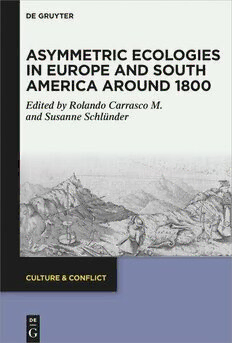
Asymmetric Ecologies in Europe and South America around 1800 PDF
Preview Asymmetric Ecologies in Europe and South America around 1800
AsymmetricEcologiesinEuropeandSouthAmericaaround1800 Culture & Conflict Edited by Isabel Capeloa Gil, Catherine Nesci and Paulo de Medeiros EditorialBoard ArjunAppadurai⋅ClaudiaBenthien⋅ElisabethBronfen⋅JoyceGoggin BishnupriyaGhosh⋅LawrenceGrossberg⋅AndreasHuyssen AnsgarNünning⋅NaomiSegal⋅MárcioSeligmann-Silva AntónioSousaRibeiro⋅RobertoVecchi⋅SamuelWeber⋅LilianeWeissberg ChristophWulf⋅LongxiZhang Volume 21 Asymmetric Ecologies in Europe and South America around 1800 Edited by Rolando Carrasco M. and Susanne Schlünder PrintedwiththekindsupportofHuman-environmentalnetworksprofileline attheUniversityofOsnabrück. ISBN978-3-11-073818-6 e-ISBN(PDF)978-3-11-073321-1 e-ISBN(EPUB)978-3-11-073336-5 ISSN2194-7104 LibraryofCongressControlNumber:2022931233 BibliographicinformationpublishedbytheDeutscheNationalbibliothek TheDeutscheNationalbibliothekliststhispublicationintheDeutscheNationalbibliografie; detailedbibliographicdataareavailableontheInternetathttp://dnb.dnb.de. ©2022WalterdeGruyterGmbH,Berlin/Boston Coverimage:JorgeJuan/AntoniodeUlloa.Observacionesastronomicasyphisicashechas(...) enlosreynosdelPerú(1748).EnMadrid:porJuandeZuñiga,1748.Digitizedversioncourtesy ofIbero-AmerikanischesInstitut–PreußischerKulturbesitz. Typesetting:IntegraSoftwareServicesPvt.Ltd. Printingandbinding:CPIbooksGmbH,Leck www.degruyter.com Contents RolandoCarrascoandSusanneSchlünder AsymmetricEcologiesinEuropeandSouthAmericaaround1800: Introduction 1 I Epistemic Asymmetries JorgeCañizares-Esguerra HumboldtandEpistemologicalColonialism:AlexandraWulf’sThe InventionofNature 15 ChristianvonTschilschke Climate,Man,andCultureinEighteenth-CenturySpain:FromFeijoo (1728)toMasdeu(1783) 35 FernandoNinaRada AndrésCavoFranco’sHistoriadeMéxico(1797):Hydrology, Regeneration,andtheSuperiorityofNature 51 LuisHachim Narrative,Writingabout“Indians,”andCreoleEpistemesintheHistorias NaturalesbyThreeJesuitsBanishedfromAmerica(1767) 65 II AsymmetricIdentities AnaHontanillaCalatayud RaceandReforminLateColonialSantoDomingo 87 RolandoCarrascoM. TheAsymmetriesofAmericanIngenium:EchoesoftheEighteenth- CenturyDebateonEugeniodeSantaCruzyEspejo 113 VI Contents IIIAsymmetries inGovernmentality andEconomy AndreasGelz BetweenAgricultureandCulture:TheRoleofNatureinJovellanos’s Memoriaparaelarreglodelapolicíadelosespectáculosydiversiones públicasandInformedeLeyAgraria 139 MiguelRosasBuendia AndeanMetallicAbundanceinRepublicanTimes:MarianodeRiveroand hisCivicEndeavor 155 MauricioNietoOlarte TheSpanishEnlightenmentandtheComprehensionoftheNewWorld: Botany,Medicine,andtheSearchforNewRemediesfortheOld Empire 181 IVAsymmetricTaxonomies RuthHill TheNewWorldofNoah’sArk 209 OlavKrämer HierarchyandContinuity:TheOrderoftheNaturalWorldinAlexander Pope’sAnEssayonManandErasmusDarwin’sTheTempleofNature 233 VAsymmetries inHuman-Environment Relations SusanneSchlünder Lima1746:ConfigurationsofCatastropheandAsymmetricEcologies 249 OttmarEtte IslandTextsandArchipelagicWriting:AlexandervonHumboldt’sIslede Cube:Antillesengénéral 277 Contents VII SandraRebok TransatlanticApproachestoNature:HumboldtandhisEnvironmental Concerns 291 ListofContributors 317 NameIndex 321 RolandoCarrascoandSusanne Schlünder Asymmetric Ecologies in Europe and South America around 1800: Introduction Justliketheescalatingclimatecrisisanditsphenomenaofglobalwarming,ice melts, changing atmospheric circulation, and extreme weather events have forced us to reconsider current human-environment relations, so too has the current COVID-19 pandemic. In the age of the Anthropocene, which was de- clared two decades ago (Crutzen and Stoermer 2000) and which has been heavilydiscussedinLatinAmericantheorywithregardtoglobalinequalities,1 thepandemicandtheclimatecrisishaveshedlightontwocorrelativefindings. Firstly,thesetwocriseshavedemonstratedoncemorethatthereisaglobalen- tanglement between economic cycles and production chains on the one hand andhealth,livingconditions,andlivelihoodsontheother,whiletheglobalim- pact of the increasing pressure on (local) ecosystems is becoming more and moreevident: Shocksemanatingfromdisturbancesinlifesystemsandclimatechangeareaffectingpeo- pleandchangingsocieties.TheCovid-19pandemichasshownhowtheeffectsoflarge- scaleshocksemergeoutofecologicalsystemsunderpressurefromsocialactivities.These shocksareaffectingthemaincomponentsofhumandevelopmentwithunprecedented magnitude,synchronicityandglobalreach. (UNDP2020:56) Secondly, the pandemic has compelled us to think about the interdependence of social and political, economic, and ecological asymmetries in our everyday lives.Liketheclimatecrisis,thepandemichasmadetangiblethevulnerability ofdevelopingnationsandemergingeconomiesaswellasgroupsthatlivepre- cariously:thereisalackoffinancialsafeguardsinplace,itisalmostimpossible tocompensateforeconomiclosses,andthereisonlylimitedavailabilityofvac- cines and health services. Health crises and social crises are closely inter- twined,andcanevencauseeachother,asthe2020HumanDevelopmentReport emphasizes: [. ..]planetaryimbalances(thedangerousplanetarychangeforpeopleandallformsof life)andsocialimbalancesexacerbateoneanother.[. . .]manyinequalitiesinhuman 1 WeareusingtheconceptoftheAnthropoceneaccordingtoM.Svampa(2019)asanopen paradigmandasadiagnosticandsyntheticconceptthatconsiderscapitalismtobetherootof anthropogenicclimatechangeanddoesjusticetothegeopolitical,economic,andsocialim- balancesbetweentheglobalNorthandtheglobalSouth. https://doi.org/10.1515/9783110733211-001 2 RolandoCarrascoandSusanneSchlünder developmenthavebeenincreasingandcontinuetodoso.Climatechange,amongother dangerousplanetarychanges,willonlymakethemworse.[. ..]Ominoussignsofdemo- craticbackslidingandrisingauthoritarianismareworrying.Collectiveactiononanything fromtheCovid-19pandemictoclimatechangebecomesmoredifficultagainstabackdrop ofsocialfragmentation. (UNDP2020:3) The inseparability of economic, social, political, ecological, and health factors raisesquestionsaboutclimatejustice,becausethegroupsthatarethemostvul- nerable and have the least protection have made the smallest contribution to the crisis. On the South American continent, the Indigenous territories and communitieswhoseintegrityisbeingthreatenedbyresourceextractionconsti- tuteonepressingexampleofthis. Thetopicofclimate(in)justice,whichisplayingacentralroleintheimpact thattheclimatecrisisishavingonourlivesandonpoliticalagendas,aswellas in the transformations taking place in society, economics, and technology, re- quiresthatweadoptholisticand–aswewouldliketostress–historicalview- points.Publicdiscourse,whichfrequentlyignorestheseintersections,isbeing confrontedbyscholarlyapproachesandtheoriesthatarefocusingonprecisely theseentanglementsbytakingpost-anddecolonialperspectives.2 Asanemergingnewfield,“postcolonialecocriticism”combinespostcolonialism’scri- tiqueofcolonialregimesandtheworkings[of]transnationalcapitalismwithecocriti- cism’sattentiontotheland[,]whichhasbeenthegistofsuchexploitation. (Banerjee2016:194) Postcolonial ecocriticism thus provides a theoretical framework that makes it possibletoengagewiththehuman-environmentrelationsmentionedatthebe- ginning of this introduction by assuming an integral perspective and taking intoaccountthefactorsthathavedeterminedtheserelationshistorically. The paradigm of the “coloniality of power,” which has been an object of centraldiscussioninLatinAmericantheory,placesparticularemphasisonthe connections between modernity and coloniality: “[. . .] ‘modernity’ is a Euro- peannarrativethathidesitsdarkerside,‘coloniality.’[.. .][T]hereisnomoder- nity without coloniality.” (Mignolo 2009: 39) At the same time, it points to a central epistemological imbalance that is the result of the Eurocentric produc- tionofknowledgeabouttheSouthAmericancontinent(PoloBlanco2016).De- colonial theory, as it is represented by Mignolo, Castro-Gómez, Quijano, and others, stresses that the colonization of knowledge has been accompanied by the establishment of very specific forms of appropriation. The Eurocentrism at 2 Foradiscussionoftheconceptualinteractionbetweenthepostcolonialanddecolonialpara- digms,seeBhambra2014.
